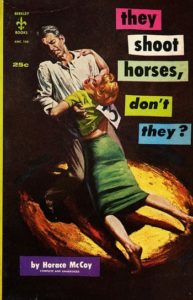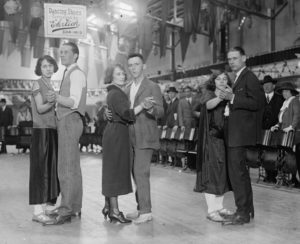
Previously: What Makes Sammy Run?
Here’s where I cheat a little on my rules for determining the greatest Hollywood novel of all time. Horace McCoy’s They Shoot Horses, Don’t They? is marginally a Hollywood novel, in that almost every central character came to Los Angeles to enter the film industry. All are unsuccessful at it—or, more accurately, they’re still waiting for success to saunter their way. Desperate and in the throes of the Great Depression, they turn to dance marathons as a way to make money until the next studio cattle call.
The novel’s narrator is Robert Syverten, a young man who has come to Hollywood to become a director. Down and out, he meets Gloria Beatty after both fail to pick up work as film extras. Gloria tells him, in a line that resonates with the emotional power of the entire novel, “If I’m not a better actress than most of those dames I’ll eat your hat—Let’s go sit and hate a bunch of people…”
Robert remarks:
Unless you are registered by Central Castings Bureau you didn’t have much of a chance. The big studios call up Central and say they want four Swedes or six Greeks or two Bohemian peasant types or six Grand Duchesses and Central takes care of it. I could see why Gloria didn’t get registered by Central. She was too blonde and too small and looked too old.
Robert and Gloria are from the middle of the country, and the reader immediately senses they have no chance of making it in Hollywood. They are more in line with Nathanael West’s people “who came to California to die” than the in-crowd Sammy Glick and Al Manheim run around with in What Makes Sammy Run?
The pair (it’s not really true they are a “couple”) agree to enter a dance marathon. “Free food and free bed as long as you last and a thousand dollars if you win,” Gloria explains. “A lot of producers and directors go to those marathon dances. There’s always the chance they might pick you out and give you a part in a picture.”
The dance marathon organizers run the contestants ragged twenty-four hours for weeks—weeks—on end. The contestants must keep moving day and night and are only allowed ten-minute breaks every two hours. They learn to eat while shaving, eat while using the toilet, and reading the newspaper while slow-dancing. Good dancers get local sponsors who supply them with free clothes, extra food, even new dance shoes. Entrants fall out of the contest due to sheer exhaustion, collapsing on the dance floor and carried off like an anonymous corpse. Some contestants are professionals who travel the country to enter dance marathons. Most are unemployed, down-on-their-luck young people who enter for the food, the cot, the music, and the company.
The novel’s grueling depiction of the entrants’ taxing tortures while fox-trotting and jitterbugging throughout an upbeat dance marathon is a model of Hollywood-in-miniature: The artifice of the organizers demanding smiles, coiffed hair, and freshened make-up for the audience, while the entrants suffer from exhaustion and dehydration, both underpaid and underfed. Even the gabby, overly-familiar emcee who attempts to bring sparkle to the competition’s grueling realities is familiar to any viewer of game shows. To drive up interest, the organizers stage a dance wedding for the audience, although the competing couple have no matrimonial intentions—echoes of today’s reality TV, which is not as real as we’re led to believe.
The novel is spare and earthy, and the language is sparse and brisk. McCoy was often compared to James M. Cain (The Postman Always Rings Twice, Double Indemnity), a comparison McCoy detested. The book is interrupted throughout by the disembodied voice of a judge rendering sentencing, an effective way to open a novel (if somewhat Hollywoodish), but a device that grows into a gimmick as the novel proceeds. Fortunately these flashes are only brief reminders, like a voice from the sky, rather than dwelled upon.
The novel’s conclusion comes crashing down in a matter of a few pages. I’m not sure I buy the narrator’s final decision, but Robert’s and Gloria’s bleak despair is palpable. Gloria’s nihilism is so pure and unyielding, it’s a miracle McCoy can maintain our interest in her for the length of the book. Robert’s naivete is almost as strong, sometimes veering into hayseed territory. Economics, greed, and detachment have left these young people clinging to a life raft leaking air, and they barely realize they’re sinking.
As mentioned, Hollywood’s presence in They Shoot Horses is slim, more like a faint church bell chime in the distance reminding the reader of the glamour and wealth not far from the seaside dance hall the marathon takes place in. McCoy’s classic is a Hollywood novel because of Tinseltown’s absence, not presence, in the story—a character everyone is talking about but is never seen by the reader.
Next: The Little Sister by Raymond Chandler
